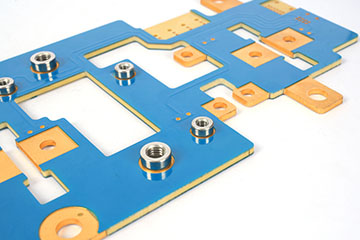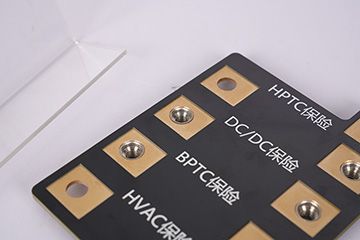Best Technology has nearly 18 years of experience in PCB manufacturing, offering a one-stop service for bus bar PCBs from layout design, diagram evaluation, prototyping and mass production to after-sales service. We are certified by ISO9001, ISO13485, IATF16949, and UL, ensuring high-quality PCBs with fast delivery. As experts in bus bar PCB manufacturing, custom bus bar PCBs are available according to your specific requirements.
What is Bus Bar PCB?
A bus bar PCB, also known as an embedded bus bar, busbar PCB, extruded copper PCB, or copper inlay PCB, is a specialized type of heavy copper PCB designed specifically to distribute power efficiently across different components on a board. Unlike traditional PCBs, which use copper traces etched into layers of non-conductive substrate to form circuits, bus bar PCBs integrate thick, solid bars of conductive material—often copper or aluminum—to handle higher currents.
The bus bar PCBs can also serve as mechanical connectors within the system, designed to accommodate screws and other metal parts for direct connections with other PCBs or system components.


Advantages of Bus Bar PCB
- The PCB stiffener busbars can increase the rigidity and strength of circuit boards, so they can be used in severe environments like automotives, military instruments, aerospace, etc.
- Higher power distribution and current-carry capabilities for power supply circuits or high-power applications.
- The low voltage drop characteristic allows all components to maintain stable power delivery, especially under high load conditions.
- The conductive bars in bus bar PCBs acts as an effective heat sink, helping to dissipate heat more efficiently than standard fiberglass PCBs, avoiding overheating problems during use.
- The ability to handle higher currents simplifies the design and assembly process without the need for multiple layout or complex traces.
- Bus bar PCBs can be used as electrical conduit, can also be used as mechanical connector.
- They are often custom designed to meet specific application requirements, providing solutions that are not possible with standard PCB technology.

Basic Parameter of Bus Bar PCB Manufacturing
- Minimum distance between copper bars is 0.8-1.0mm
- Copper thickness for bars can be 1.0mm-3.0mm
- Current carrying capacity: 50-300A
- Copper bars can be bent if customer has requirements
- Surface finishing options for bus bar PCBs: ENIG, immersion silver, gold plating
- Board thickness: 3.0-6.0mm
- Hole wall thickness >=25um
- Thickness to diameter ratio: 1:6 or 1:7 (for 1.0mm copper with a minimum of 0.7mm holes).
- Layer count: typical 3-4 layers; additional layers possible with design evaluation.
- Maximum dimension is 600*400mm for standard bus bar PCB, 900*600mm for double sided PCB
- The lead time of 3-4L bus bar PCB is around 13-15days, add 3days per layer over 4 layers.

Design Guide for Bus Bar PCB
- Copper or aluminum is typically used for the bus bars due to their excellent conductivity and thermal properties. Copper is more conductive, while aluminum is lighter and offers better resistance to oxidation.
- Choose substrates capable of handling high thermal loads and providing good electrical insulation. Common material we used is FR-4.
- Determine the maximum current that each busbar needs to carry, so we can know the required cross-sectional area of the bus to minimize drag and heat buildup.
- Use the length of the bus and the resistivity of the material to calculate the allowable voltage drop on the bus to ensure that it remains within an acceptable range.
- Add mechanical mounting points to the bus, such as screw holes or connector slots.
- Consider the mechanical stresses that the PCB may encounter, ensuring that the bus is flexible enough to withstand bending and strong enough to support structural loads.

Applications of Bus Bar PCB
- Electric Vehicles
- Renewable Energy Systems
- Industrial Automotive
- Power distribution units (DDU)
- Data centers
- High-power spacecraft
- Consumer electronics
- Power inverters and converters
- Aerospace and defense




